Eating For Healthy Teeth
/In dentistry, our primary focus is the health of your teeth and gums. However, since you primarily use your teeth for chewing food, we are naturally interested in what you eat. How and what you eat has everything to do with your ability to maintain good oral health. Here are some basic principles ofhealthy eating that we think are good for your oral health as well as your overall well-being.
Avoid Sugar
Evidence that supports the wisdom of eliminating sugar from our diets is overwhelming. Sugar is the main culprit of medical conditions ranging from obesity to diabetes. Eating sugary foods or drinking sweet beverages is also one of the best ways to create cavities in teeth. This is because sugar feeds the bacteria in our mouths that create the acids that eat away at the surface of our teeth. Sugar has also been identified as the cause of an internal inflammatory process that can contribute to the development of heart disease and cancer.
While it may not be possible (or desirable) to eliminate sugar completely from your diet, there are significant steps you can take to adjust your sugar intake and preserve youroral health. First of all, try to avoid, if at all possible, processed, refined white sugar. This may be the most dangerous form of sugar around. Other sweeteners such as maple syrup and honey are preferable. But even these must be used in moderation. A sweet tooth is just a habit, and habits can be unlearned if you are motivated to unlearn them.
Fresh Fruits and Vegetables
Fresh produce is always the best source of vitamins and minerals, and should be the staple of any good diet. Many vegetables and fruits, such as celery, apples and carrots, can actually help to keep teeth clean. With their crunchy texture and abundance of water, they help to neutralize mouth acids produced by oral bacteria that wear away at tooth enamel.
At the same time, citrus fruits, while containing many good vitamins, should also be eaten in moderation, as the acidity in their juice is bad for tooth enamel. However, since we don’t really want to discourage you from reaching for an orange instead of a candy bar, you can offset the risk to your teeth by rinsing with water after eating citrus, or brushing your teeth a half hour afterwards.
Low Acidity
As we mentioned in regard to citrus fruits, foods or drinks that are high in acidity can be damaging to the surface of your teeth. Coffee, tea, tomato sauce and vinegar are also high in acidity. However, there are things you can do to mitigate the potential damage they may cause. For example, using milk or cream in your coffee is a great way to neutralize the acid it contains. Dairy products in general are a great way to neutralize acidity while at the same time, adding healthy calcium into your diet, to help strengthen bones and teeth.
Drink Plenty of Water
Water is essential for healthy bodily function, but nowhere is it more important than in the mouth. Not only will water contribute to the neutralizing of harmful cavity-producing acids, but it also helps to wash away food particles and other debris that can get lodged between teeth. If this food is not removed, it begins to decay, creating an environment in which bacteria can thrive, feeding the whole cavity cycle once again. Take our advice. Drink plenty of water! It’s one of the easiest methods to protect your oral health. As a bonus, water will also help remove excess toxins from the body, leading to healthier organs, clearer skin and more energy. What’s not to love about all that?
Brush Your Teeth Regularly
Of course we can never talk about eating well if we don’t mention the fact that you need to brush your teeth afterwards. Keeping your mouth clean and free of excess food particles will not only prevent cavities, but it will also help keep your breath smelling fresh and sweet! No go out and enjoy some healthy food!
